NEET is a court-ordered examination, supposedly aimed at meritocracy.
However, over the past years when the Modi government at the Centre began implementing it, it took on political and casteist colours, argues N Sathiya Moorthy.

News reports that 'coaching clusters' in Rajasthan, Haryana and elsewhere in the country produced most top scorers in the already controversial NEET exams for medical admissions this year has revived the forgotten question of accessibility to higher education that is still at the core of arguments put forth by critics of the system, introduced at the instance of the Supreme Court, a few years back.
While the Supreme Court Bench, headed by Chief Justice Dr D Y Chandrachud, had expectedly dismissed petitions seeking the cancellation of the year's NEET-UG exams unmindful of the increasing political demands seeking an end to what has become an annual ritual of sorts, the judges have also ordered the deduction of five marks for 400,000 candidates against this year's total of above 2.3 million -- or, nearly a sixth of all examinees.
But there is a turn. The legal debate inside the court and the socio-political discourse, which has almost become unilateral and un-contested after all those staunch supporters of what was touted as a merit-inducing scheme too began feeling that something was rotten on the NEET front, may force the government or the higher judiciary on another occasion, to take a more holistic view of the single-national medical entrance exam.
Ending NEET may not be an option, not for the courts at least for some more time to come -- but fixing accountability at every turn, and considering possible de-centralisation of the examination processes, may be an option, though outlandish at the moment.
But then any easing of the present system could lead to arguments for and against going back to region/state-wise conduct of NEET exams through independent secretariats, leading ultimately to demands for return to the pre-NEET scheme of state governments doing so, under a law and scheme of their own.
At the centre of it all is a larger issue: The socio-economic question on the affordability of NEET exams -- rather, high-cost coaching -- and it will be interesting to watch how the Opposition INDIA combine is likely to take it up in the Budget session of Parliament, and how the non-BJP partners in the ruling NDA react.
Yes, NEET is a court-ordered examination, supposedly aimed at meritocracy. However, over the past years when the Narendra Modi government at the Centre began implementing it, it took on political and casteist colours.
In particular, supporters of Prime Minister Modi, especially outside Parliament, almost made it a personal fight when debating it in public platforms, starting with social media.
This generated a counter-narrative and a counter-platform, where again politics overtook the socio-economic concerns, as originally explained.
The blurred border-line has thus created a new space, where every NEET time has also become an occasion for an unending war-of-words, which ebbs after the results are out but has not witnessed full and complete closure, yet.

Those arguing the case for a NEET-like exam for professional college admissions even before the Supreme Court's firm decision have always based that 'meritocracy' suffers in the face of indiscriminate reservations, especially those that were not originally mandated by the Constitution at birth.
To them, state-level medical college admissions were a bane, especially those in which students from outside a particular state were not allowed to participate.
Even more crucial for them were/are medical college admissions in states like Tamil Nadu, which after folding up the earlier existing state-wide entrance examinations, decided to award medical seats on the basis of Plus-Two scores by individual students.
This threw up an argument that the CBSE syllabi and examination model for Plus-Two were tougher, holistic and tested a student's intelligence and grasping-power than those contained in some state-level syllabi.
At focus, both mentioned and unmentioned, was/is the Tamil Nadu syllabi and exam model for Plus-Two students.
It has often been argued with some conviction that the Tamil Nadu scheme, for instance, was/is rote-based, and was in effect a mug-and-vomit system, where the student did not have to apply his mind, or had to prove (even to himself) that he was intelligent enough to grasp medical nuances, which were central to a qualified doctor saving his patient.

But today, after this year's 'NEET scam', nay-sayers from the past are pointing to the way medical students were being equipped or manufactured through 'question-leaks' and 'coaching clusters'.
As they point out, one of the main reasons for the Tamil Nadu government to decide on basing medical admissions exclusively on Plus-Two marks owed to the emergence of coaching clusters in and around the trucks and bore-well town of Namakkal, which is also a major eggs-producing centre in the South.
This had meant that students from financially poor families could not afford those residential schools, which made a doctor or broke a student.
There were also early reports, rather rumours, about 'guided examinations' in those 'coaching clusters'. There, away from the glare of the government authorities and the media, tutors, appearing as invigilators for medical entrance exams, were known, or believed, to guide whole classrooms of students with the correct answers to individual answers.
There were also similar rumours of 'leaked' question-papers at the time, but not as much evidence became available. However, there were surprise raids by education authorities, at times aided by the police that produced massive instances of 'guided exams'.
The fact is that the abolition of medical entrance and even engineering entrance exams -- the latter when the number of seats was relatively few and pupil-aspirations and parental peer-pressure were very high -- did ensure that there was no need to enrol in high-spend residential cluster tutorials that the average student, both rural and urban, could not afford.
Yet, there was also the case of parents admitting their children in these cluster schools, for the latter to score high marks even in their Plus-Two exams.
Once again, students from humble backgrounds could not afford it, nor compete with counterparts from affluent families, who were / are spending lakhs and lakhs per year on those 'cluster centres'.
It was argued that Tamil Nadu's rote-and-answer system, derisively dubbed 'mug-and-vomit' scheme, ensured that those from multiple tuition centres and coaching clusters would not gain any extra or extraordinary advantage, as long as the other section did it in their own way, from their relatively ill-equipped rural schools and family circumstances.
The argument was that professional colleges by themselves were a great leveller or equaliser, and had their own ways of throwing up qualified and equally competent engineers and doctors at the completion of their full course.
If there was any differentiation, it was much less than the original scheme, or the later-day NEET, which were designed to create inequality and inequity.
After all, it was argued, there would still be some distance to travel for a (bright) student who had completed his medical education in a government college in a rural setting and the one in urban centres like the state capital of Chennai.
According to them, medicos, for instance, who enrolled in high-cost private medical colleges stood to gain in terms of exposure to high-end technology that might be lacking in government colleges, especially in rural areas -- but the latter made up for it, at a different level, in terms of the number of patients he or she gets to attend and learn from, as a medico.
As is pointed out, NEET got rolled out at a time when corporate online tuition began competing, if not outright replacing 'cluster coaching centres'.
The corporate fees was much higher, too, and thus the rich-poor divide in terms of access and affordability to private tuition for medical entrance examinations in the country got widened and accentuated even more.
Only that those who had to take notice wantonly looked the other way -- as it had become a Centre-state ego-trip of sorts.

There is some truth also in the Tamil Nadu argument that pre-NEET medicos serving in the state had not been the cause for any major case of 'medical negligence', which has the tendency of reaching the courts in these parts.
Even public protests against medical negligence are few and far between, especially when it comes to government hospitals and their doctors.
Tamil Nadu has the highest number of medical colleges in the country, at least one each in each one of the 38 revenue districts. They are either operational for long, or under construction and have been sanctioned.
This is apart from very many private medical colleges, where too, NEET is applicable.
As successive governments are not tired of pointing out, the state has the highest proportion of doctors per 1,000-population in the country, rivalling Scandinavian nations.
There is also general agreement that the medical services in these medical college hospitals are also on par with a medium-level private hospital, but without the former levying any fees.
Anecdotally, it can be said that many first-generation doctor, or even a graduate, from many rural homes, are wedded to public service, and do not care to follow up their studies by signing up for a PG course.
It is another matter, the state government, under predecessor AIADMK government of chief minister Edappadi K Palaniswami fought and won a Supreme Court case against the central authorities cancelling the state quota available for government doctors to join post graduate courses, with a commitment to return to work after completing higher studies.
The EPS dispensation also fought and won another case on the NEET front, when the Supreme Court permitted 7.5 per cent reservation for government school students from rural areas in the state.
But the overall governmental anxiety is that NEET-passed medicos, rather those from affluent backgrounds that could pay high tuition fees for coaching centres, on-line or off-line, may not want to join the government service and serve the people directly.
Instead, they might join corporate hospitals that are mushrooming across the state over the past two decades, which pay high salaries to their doctors, and also charge their patients high.
This would be despite the health insurance schemes available to the common man, either under the state government scheme or central scheme.
The fear is that over time, all of it could lead to a situation, where government hospitals across the state could suffer for want of qualified doctors, and the common man too would suffer for want of doctors to treat them in adequate numbers.
A reversal to pre-NEET system of medical admissions, based on Plus-Two marks, alone would help -- or, so goes the argument.

Today, Tamil Nadu, for instance, has a long-pending 'unanimously-passed' bill and a few resolutions on the selective exemption or abolition for the state from NEET.
Of course, when NEET is the subject, the debate also centred on the increasing number of 'NEET suicides', year after year.
Lately, a few instance of 'NEET suicides' were reported from other states, too. Most of them owed to aspirations competing with affordability, so to say.
It remains to be seen how the DMK, which is a key partner in the Opposition INDIA combine, takes it up in Parliament's Budget session and how other partners react.
This is because barring the DMK and also other regional parties from the state, most Opposition allies from across the country, want NEET regulated, not abolished.
Only in Tamil Nadu, the DMK and also the Opposition AIADMK, among other regional and sub-regional political parties, want a 'NEET exemption' for the state.
From purely political terms, it will be interesting also to watch how AIADMK members react to the DMK's revived request in the Rajya Sabha. The AIADMK did not win any seat in this year's Lok Sabha elections.
N Sathiya Moorthy, veteran journalist and author, is a Chennai-based policy analyst and political commentator.
Feature Presentation: Ashish Narsale/Rediff.com
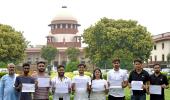


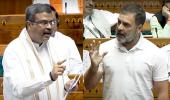





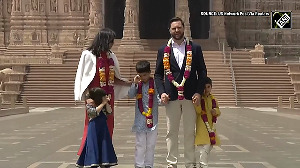
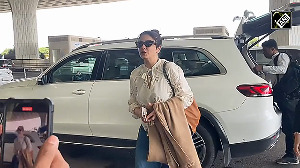
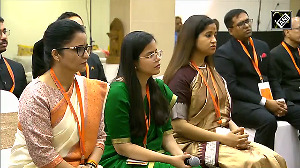
 © 2025
© 2025